Tigers in a variety of moods -- ferocious, smiling, serene and roaring -- can be spotted on and around buildings all over the Princeton campus. The tiger took hold as the University's mascot in the late 1800s, when sportswriters started to refer to players as "tigers" and carved stone tigers began appearing on campus buildings.
"The Tigers of Princeton University: A Campus Safari and Photo Essay," a book produced by the Office of Communications, provides a tour of the numerous tigers on Princeton's campus.
• Princeton's class of 1879 donated the stately bronze tigers guarding the entrance of the University's landmark Nassau Hall, which was built in 1756. The tigers were installed in 1911. Visitors frequently can be found sitting on the sculptures to gain a tiger's eye view of the front campus and FitzRandolph Gate, the University's main entrance.
• The first freestanding tigers on campus grace the gateway between Blair and Little halls, where they were installed in 1902. The bellowing beasts sit up on their hind legs, each propping up a shield atop a gatepost.

• Resting high upon Campbell Hall is a small crouching tiger holding a book with the number 77 in honor of the class of 1877, which donated the building. It is among several tigers honoring the class of 1877 that adorn the dormitory, which was completed in 1909.
• The tower of Holder Hall, built in 1910, features brass tiger weather vanes on each of the tower's four corners. The tigers appear to be climbing up the poles.
• Several figures keep watch above the main entrance to Dillon Gymnasium, including a striking tiger holding a shield parallel to the ground. Many small tigers also can be found on shields at Dillon, which was erected in 1947.
• Two dark wooden tigers slink down in the shadows on opposite sides of a dormer on the east side of Henry Hall, built in 1922. The building also is adorned with a growling tiger head on its street side.
• Patton Hall has several carved tigers, three of whom have large grins on their faces. The smiles are a rarity among the campus' fierce, noble beasts.
"The Tigers of Princeton University" is available for purchase at the Princeton University Store.










